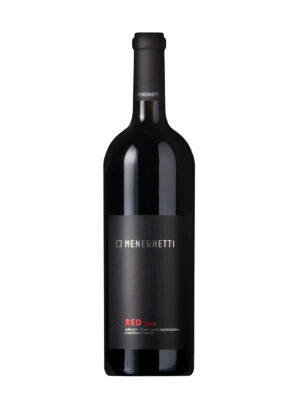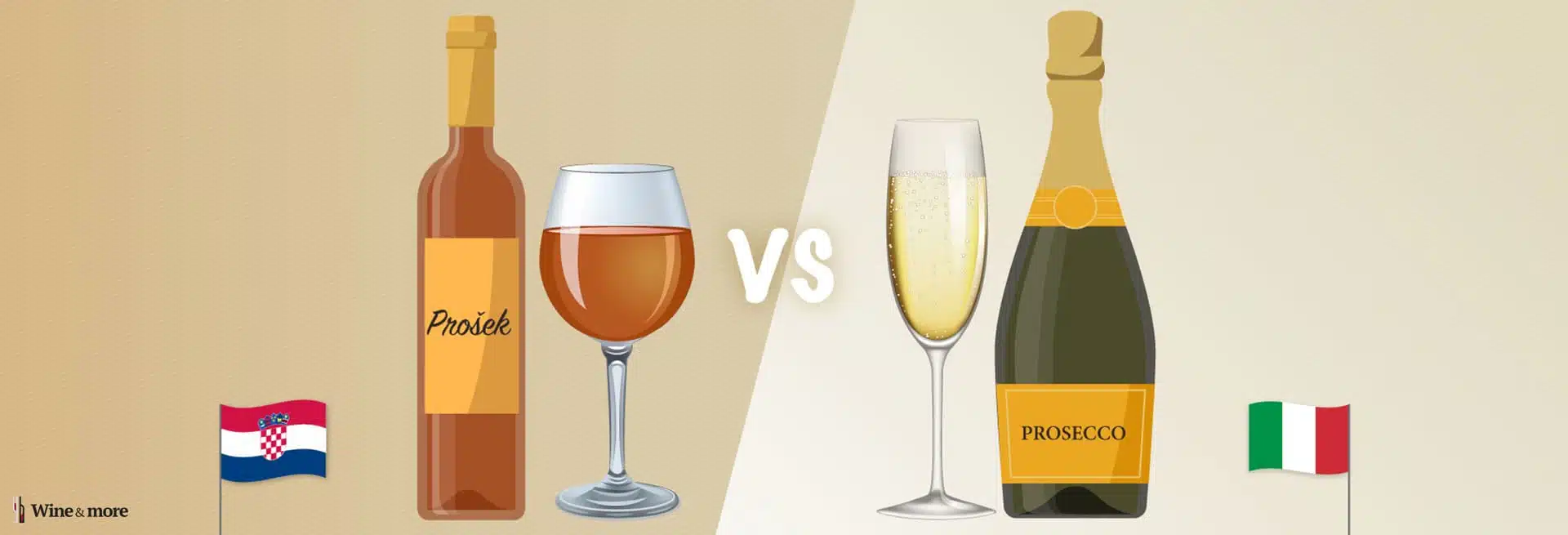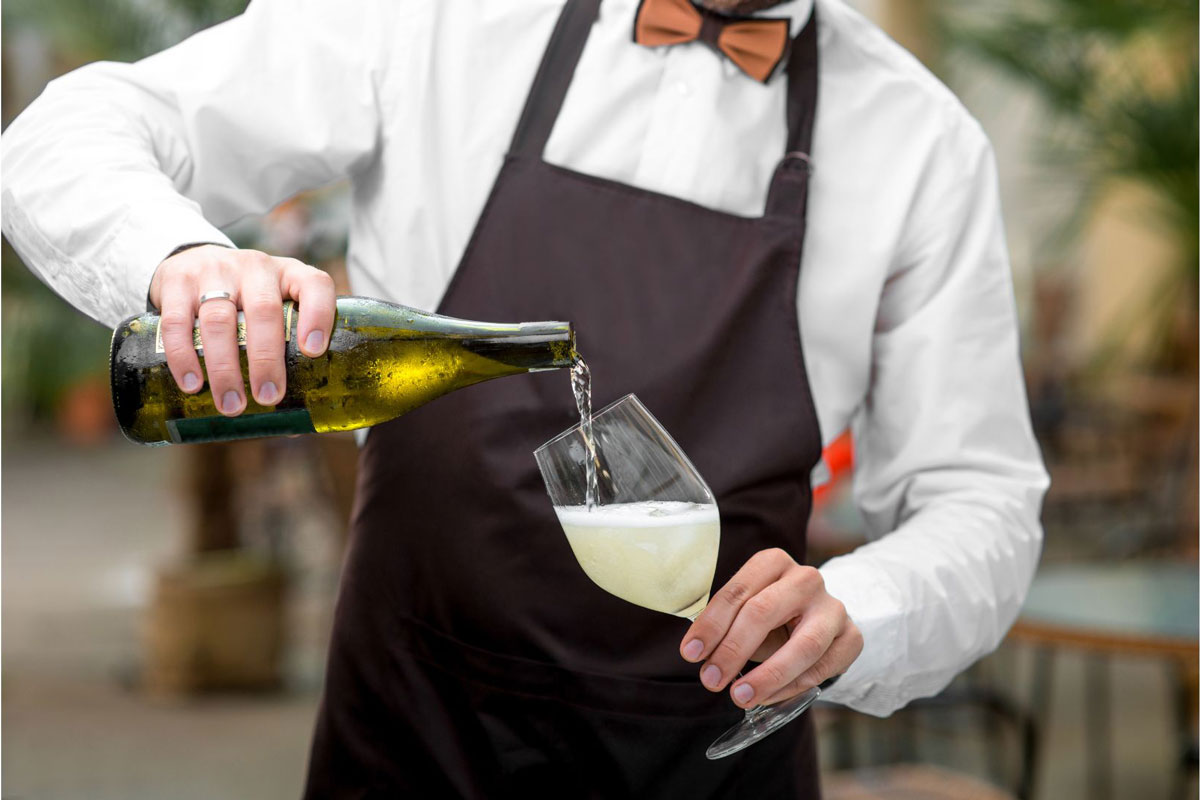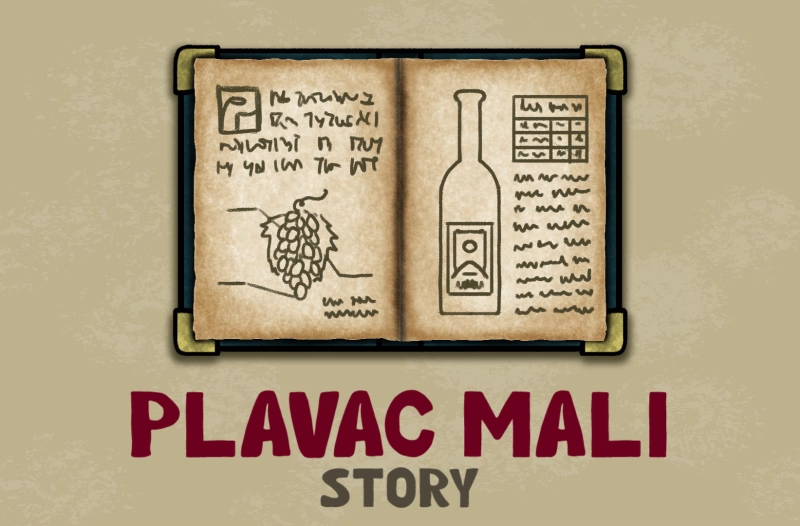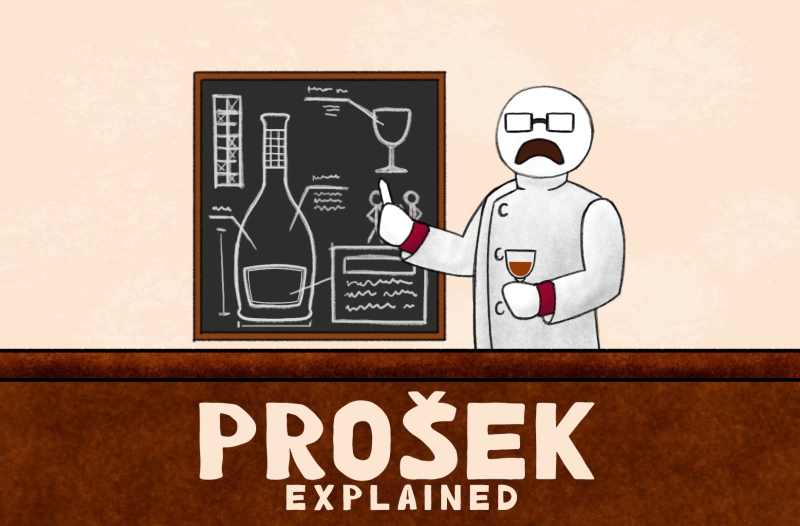Croatian Prošek vs. Italy’s Prosecco
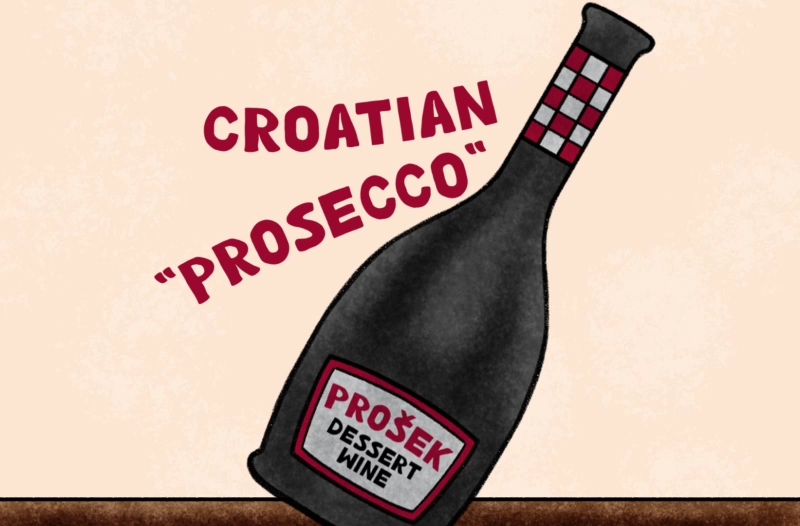
Wine is essential and powerful: weddings, business deals, alliances, and agreements are all often made over a glass or two of wine. But one Croatian wine has earned a place in international media headlines by almost making a political and diplomatic scandal!
Regarding Croatian Prošek and Italy’s Prosecco, one might think they are similar due to their similar-sounding names. However, the two are quite distinct, and their differences and unique qualities are worth exploring.
The controversy around Prošek and Prosecco
In the spring of 2013, just a couple of weeks before the long-awaited official reception of Croatia to the European Union, news broke that once Croatia became an EU member, Croatian winemakers would be forbidden to make, advertise, or sell Prošek, a traditional Croatian sweet wine.
The ban was allegedly called for by the consortium of Italian makers of Prosecco to protect their wine, which is registered and protected within EU trademark laws.
The two wines’ names were declared too similar, and it was claimed that Prošek might mislead and confuse customers.
Since Prosecco’s name and origin were already protected by EU laws, it was asserted that Prošek should be renamed.
It is an understatement to say that the Croatian public, especially winemakers, was shocked. Anyone who has ever tasted Prošek would be sympathetic to the surprise because the two wines are entirely different in almost every way.
The only thing they have in common is a similarity in name.
Is Italian Prosecco wine similar to Croatian Prošek?
No, they represent entirely different wine styles and have completely different production methods. We all adore Prosecco, but we should drink a lot more of it to confuse one with the other.
Prošek is a traditional Croatian sweet wine made from dried grapes, considered medicine in ancient days.
Here are the key differences:
PROSECCO
- Prosecco is an easy-drinking sparkling wine;
- Grapes for Prosecco generally have low sugar content and high acidity;
- The Prosecco sparkling wine is produced in the Charmat or Italian Charmat method, developed by Martinotti (the second fermentation takes place in stainless steel tanks);
- Prosecco is a light, bubbly wine with up to 12% alcohol content in most cases, light in colour with subtle citrusy and fresh apple aromas;
- Prosecco is almost exclusively produced from a variety called Glera.
PROŠEK
- Prošek is a sweet dessert wine, high in alcohol and rich in dried fruits, sweet and nutty aromas;
- Prošek’s colour is deep gold, amber, or dark red in colour;
- Prošek is a thick and syrupy still wine;
- Prošek is made using dried wine grapes;
- Grapes for Prošek are dried on straw mats or dried on the vine;
- The must (the freshly-pressed grape juice) is then macerated for a couple of days and then pressed to separate the juice from the skins, which then ferments for more than a year and is left to age for a minimum of one more year in oak barrels),
- It takes at least 1 kilogram of dried grapes to make 0,75 liters of Prošek;
- Prošek is made from red or white grape varieties typical for the Dalmatian wine region, such as native Bogdanuša, Maraština, Grk, Plavac Mali, or Babić;
- the technique of making Prošek dates to pre-Roman times makes it obvious it was never intended to imitate Prosecco.
What is Prošek wine?
Prošek is a sweet dessert wine made from red and/or white dried grapes. It has a long history in Croatia, where it has been produced for centuries and is an important part of its cultural heritage.
Prošek is made using traditional methods, with the grapes being dried on straw mats or, ideally, naturally dried on the vine. The wine is traditionally aged in oak barrels before being bottled.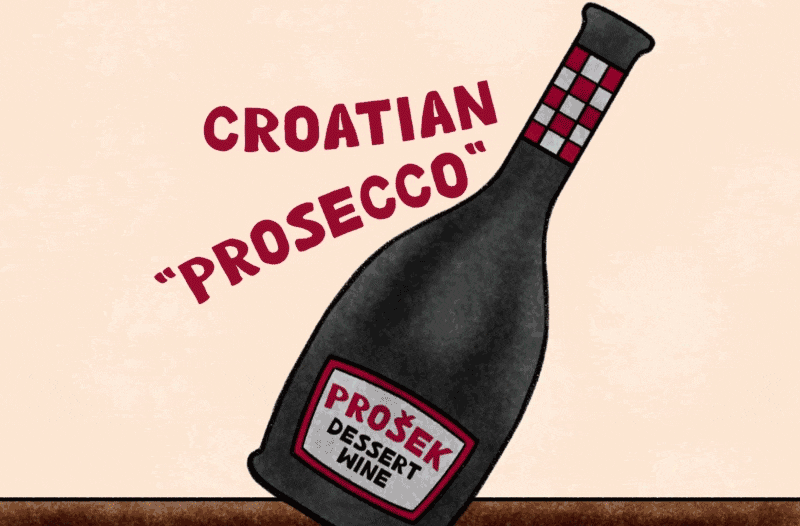
Prošek tasting notes
Depending on variety and production method, Prošek has a rich, golden colour and a complex flavour that is both sweet and acidic. It is often described as having creamy caramel, dark chocolate, jammy notes of dried fruits, citruses, Dalmatian spices, and sweet barrique notes with almond and walnut aftertaste.
The taste is complex, with delicate tannins and integrated freshness.
Prošek wine food pairing
It perfectly complements any dessert and pairs wonderfully with dry fruit, nuts, and cheese. Prošek in Croatia is typically enjoyed as an after-dinner drink.
That is perhaps the only similarity between Prošek and Prosecco – both can be enjoyed independently, without any dish to accompany it.
Does Croatia have a sparkling wine?
Yes, Croatia makes many sparkling wines as well.
Many Croatian sparkling wines are produced using the traditional method, where the secondary fermentation occurs in the bottle, similar to Champagne.
Numerous Croatian sparkling wines are also produced using the Charmat method, where the secondary fermentation occurs in a pressurised tank, similar to Prosecco.
Can you get Prosecco in Croatia?
Prosecco is most certainly available in Croatian bars, restaurants, cafes, and retail stores.
Furthermore, many Croatian winemakers, particularly in Istria, vinify their Charmat method sparkling wines in Valdobiaddene or other Orthodox Prosecco places.
Yet, a rare few Croatian wineries possess their own AutoClave pressurised tanks to make their own Charmat-method sparkling wine, technologically identical to Prosecco, but, of course, forbidden to be named as such.
However, if, for clarification purposes, we could consider Prosecco as a category of sparkling wine and not as a protected name, these wines would be a “Croatian Prosecco”.
As such, it could be made from any grape. For example, Graševina.
Croatian made “Prosecco-style” wines
Today Blanc
“Today Blanc”, in its essence, is a 100% Graševina grape, meticulously crafted. Grapes are harvested at the peak moment, ensuring a delicate balance of heightened acidity and lower sugar levels. The winemaking process is a symphony of precision – after a gentle press, fermentation unfolds over a maximum of 14 days at a cool 16°C.
The magic continues as the wine gracefully rests, preserved in fine yeast sediment, with a delicate stirring ritual once to twice a week. Enter the Autoclave tanks, where the secondary fermentation occurs, lasting another blissful 14 days at the same 16°C. Autolysis, a dance of yeast extinction, captivates for a month and a half, bringing depth and character to the wine as fermentation concludes.
This impeccable creation is a welcoming embrace of the vibrant notes of citrus fruitiness and invigorating freshness, subtly kissed with a touch of floral elegance to enchant your palate.
Today Rose
Another Croatian-made example of this general style is a surprisingly balanced Blaufränkisch-based sparkling wine named “Today Rose”.
This Sparkling Rosé, artfully crafted from the expressive Frankovka (Blaufrankisch) grape, begins with a primary fermentation of the base wine at a cool 16°C. Enter the Autoclave tanks, where the secondary fermentation unfolds, a twelve-day symphony that adds depth and effervescence to the blend. The wine then gracefully ages on yeast for two months, evolving into a masterpiece of balanced taste.
Enosophia Sparkling Frankovka Rose is a harmonious dance of bubbles, a rosé that strikes the perfect balance. It is a surprisingly persistent presence on the palate, with wine’s clarity and elegance as pillars supporting a core of invigorating freshness, inviting you to indulge in a pink sparkling experience.
Nice To See You
Introducing “Nice To See You,” a delightful fusion of Chardonnay and Pinot Noir that promises an exceptional sensory journey. The magic begins with a swift press, followed by sedimentation, paving the way for a meticulous process that elevates this blend to bubbly bliss.
The grape varieties undergo a separate fermentation lasting 12 hours at a cool 16°C, setting the stage for the wine to gracefully rest at fine yeast sediment for three months with a gentle stirring imparts complexity.
Enter the Autoclave tanks, where the secondary fermentation takes flight over a 14-day period, followed by an enchanting autolysis of yeast for a lavish five months. The final touch involves meticulous filtration, preparing this effervescent elixir for its grand debut in the bottle.
Behold the result—a wine that flutters on the palate with an unobtrusive, fresh aroma, showcasing mild fruitiness with distinctive fruity notes and a hint of yeasty complexity. To fully appreciate its charm, serve “Nice To See You” ideally at 6-8°C (43-46℉) in a glass for white wines.
What is the most popular wine in Croatia?
While Prosecco is certainly one of the world’s most popular sparkling wines; as a consequence, in Croatia, Croatians preferred wine choices focused on domestic varieties:
- Graševina,
- Malvasia Istriana,
- Plavac Mali
One of the most popular and widely recognised wines in Croatia is Graševina, a white grape variety that is widely cultivated in the continental part of Croatia, particularly in the Slavonia region.
Another notable wine is Malvasia Istriana, a significant and well-regarded white grape variety in Croatia. Most Malvasia wines are easy-drinking and lighter-bodied dry wines.
Plavac Mali is a red grape variety that is known for producing robust and full-bodied red wines. It is particularly associated with the Dalmatian coast.
Conclusion
While Prošek and Prosecco are both wines, they differ in taste, production methods, cultural significance, and availability.
Prošek is deeply rooted in Croatian culture and integral to the country’s winemaking heritage, but available in tiny quantities. In contrast, Prosecco is a popular sparkling wine from Italy that gained global recognition.
In terms of production, Prošek is made using traditional methods, which can be time-consuming and labour-intensive. Conversely, Prosecco is produced using modern techniques for greater efficiency and consistency.
Prošek and Prosecco have unique qualities and are worth trying for wine lovers who enjoy exploring different wines.
Whether you prefer Prošek’s rich sweetness or Prosecco’s crisp freshness, both wines offer a unique and enjoyable experience.
The similar-sounding name IS the only thing the two wines have in common.
To be sure you never confuse Prošek with Prosecco, remember that the Croatian dessert wine is pronounced as ‘pro-shek’ while the Italian sparkling wine is pronounced ‘proh-sec-coh.’
Besides the differences in production and wine style, remember that a bottle of Prošek is a kind of family pride and heritage in the Dalmatia region, where it’s most widely produced. Recipes are passed down from generation to generation, and even commercial producers are small, family-owned wineries.
Prošek is served on special occasions such as celebrations, birthdays, holidays, or anniversaries, and a small, half-litre bottle of Prošek is considered an excellent gift for such an occasion.
And what about the diplomatic scandal? It turns the saga, and the controversy continues…
On the other hand, Croatian wineries are producing “Prosecco-style” wines. Since it is not made in Italy and under their regulations, it cannot be called Prosecco.
But it is made under the Charmat method, with second fermentation in pressurised autoclave tanks. Many Istrian winemakers send their wines to secondary fermentation to Prosecco producers.
But there are the ones who make them in their own autoclave system, and the most distinguished is Enosophia winery in Slavonia.
Since they’re not governed by the Prosecco rules of using Glera grape, they use their own varieties to accomplish three styles:
- Today Blanc – made from Graševina grape
- Today Rose – made from Frankovka (Blaufrankisch) grape
- Nice To See You – made from Chardonnay and Pinot Noir grape, grown in Slavonia.
Cheers 🙂


